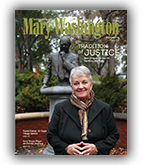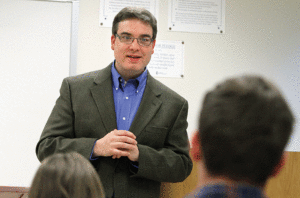When Timothy O’Donnell came to Mary Washington in 1999, a year after James Farmer retired from teaching here, he knew little about the civil rights leader.
But soon, the young professor of communication was learning about the architect of the 1961 Freedom Rides.
“It really was the serendipitous moment of somebody saying, ‘You should do some research,’ ” O’Donnell said of the start of his interest in Farmer, who taught history and American studies in Monroe Hall for more than a decade.
Back then O’Donnell was director of UMW debate. He went on to shape his career around Farmer, who at just 14 had joined the Wiley College debate team. Since then O’Donnell has tackled major academic projects, like rebuilding the debate program and leading UMW’s recent reaccreditation process. But he’s never stopped teaching himself – and his students – about James Farmer.
O’Donnell grew up in Pittsburgh dreaming of becoming a Steeler. He was a starter on his middle school football team, but eventually he found his true passion off the field. “I really enjoyed taking charge of things, and debate was an outlet for that,” O’Donnell said.
He chose his high school for its debate team, then earned a bachelor’s degree in philosophy and a master’s degree in
communication from Wake Forest University. His Ph.D. in communication is from the University of Pittsburgh.
While at Mary Washington, O’Donnell has worked to revive debate at historically black colleges; served on dozens of committees; and earned a reputation for being stingy with A’s.
“Students understand that my classes are going to be demanding,” O’Donnell said.
He lives in Stafford County with his wife, Leah Cox, UMW special assistant to the president for diversity and inclusion, and his 16-year-old stepson, Omar.
Though O’Donnell and Farmer never met, they’re linked by a love of skillful debate, mirrored in UMW’s curriculum. Like a liberal arts education, O’Donnell said, the craft of argumentation requires broad knowledge and the ability to communicate well and solve problems. “That’s what we need in this world,” he said, “people who can make good decisions.”
What motivates you? Competition, opportunity, fear – fear of falling behind, of not maximizing potential, of failure. I get frustrated about unrealized potential and squandered chances.
What inspires you? Great leaders, great coaches, great teachers.
What do you enjoy doing? Working; watching Omar play baseball.
What are you passionate about? My family.
What keeps you awake at night? The competition, whatever that may be. When you’re coaching debate, you’re constantly worried about what other teams are doing. When you’re working on accreditation, you’re worried about what other institutions are doing.
What would people be surprised to learn about you? That I have a full set of catcher’s gear. I have to. It was getting increasingly difficult to catch for Omar as his fastball gained velocity.
What are you reading right now? The Other Wes Moore: One Name, Two Fates by Wes Moore.
How do you use debate in your private life? There are very few decisions that I make that I haven’t thoroughly researched. I’m the planner.
The producers of The Great Debaters – a film starring Denzel Washington as Melvin Tolson, James Farmer’s debate coach at Wiley College – asked you for help with the film. Were you flattered? It would have only been flattering if Denzel had picked up the phone and said, “Talk to me about how you teach debate.”
If you could talk to James Farmer, what would you ask him? I’d want to talk to him about his undergraduate debate experiences, his memories of Melvin Tolson, and, of course, his debates with Malcolm X. There’s no doubt debate is a high-impact educational practice, and I’d like to hear how he thought his debate education was instrumental to his work as a civil rights leader.
How would you describe yourself? I wouldn’t. I hate doing that.
What’s one thing you would never do but you probably should? Make small talk at a cocktail party.

